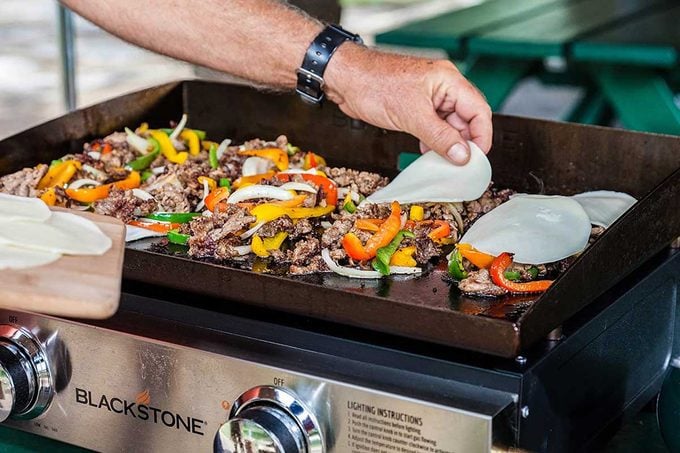During the height of the pandemic, one of the little joys of normal life that I missed was a proper breakfast from a local diner — all grilled on a flat top.
Many other foods traveled fine in a takeout box, but not fried eggs and hash browns. Those do best fresh from the griddle, delivered with a piping hot cup of coffee. We made a point of sitting down to one of our first post-vaccination restaurant meals at a diner for that very reason.
Now, with a flat top grill in the backyard, I can quickly and easily replicate the diner experience at home — without the wisecracking wait staff.
What Is a Flat Top Grill?
Flat top grills, also known as griddles, are exactly what they sound like: outdoor cooking appliances with a large, flat cooking surface. They’re typically heated from below by gas burners, though some use charcoal or pellets. Because the cooking surface is solid, the food never comes in contact with the flame.
Further, the grease that would typically drip down the open grate of a traditional grill, causing flareups, remains on the surface until you push it away into a grease trap. Just like at the diner.
Types of Flat Top Grills
When you start shopping for a flat top grill, you’ll encounter these types:
- The most common looks much like a traditional gas grill with the top cut off. Most have a hanger for a 20-pound propane tank on one side of the grill cart (some may hook into your the natural gas line) and two or four wheels. Two shelves, one either side of the cooking surface, provide a place to prep foods and set ingredients.
- Compact, tabletop flat top grills with small cooking surfaces are handy for camping or tailgating. These are typically heated with a small propane canister, like one you’d use with a camping stove.
- Some flat top grills resemble the hibachi you might find at a Japanese steakhouse. Of course, any flat top grill will allow you (with practice) to replicate your favorite teppanyaki.
- Instead of buying a flat top grill, you could add a griddle surface to an existing propane or natural gas grill. Some are sold as accessories for specific grill models, while others fit universally atop your existing grill grates.
Flat Top Grill Pros/Cons
Versatility: A flat top grill lets you cook many more types of food than would typically work on a traditional grill, since the solid surface keeps small food items from falling into the flames. Think pancakes, fried rice and eggs.
Grease: A flat top grill holds grease on the cooking surface, where it can build up. Diverting it into a grease cup is part of cooking on a griddle.
Lack of smoke flavor: Since flames never touch your food, you won’t get the smoky flavor so often desired from outdoor cooking.
How To Choose a Flat Top Grill
If you know you want a flat top grill, consider these things:
- What will you be cooking and in what quantity? Flat top grills are typically rated based on the total cooking surface area, listed in square inches. A larger surface gives you more room to cook, while a smaller surface is better for camping or tailgates.
- What is the BTU number? British Thermal Units (BTU) measure the output of the burners. A higher BTU number means more heat.
- How is the grease managed? You’ll need to clean grease traps often, so it’s important they work well.
How Much Does a Flat Top Grill Cost?
We’ve seen some portable, camping-style griddles available for $150 and $200. One popular model is the Blackstone 1666 22-inch griddle.
Larger backyard models range from $350 to up to $1,000. A popular model is the Camp Chef 600 four-burner.

Accessories for a Flat Top Grill
Flat top grill cooking tools are often the same as those for your outdoor grill.
- Large, long-handled spatulas and tongs for moving food around.
- A meat thermometer to ensure food safety. You can also use an infrared thermometer to check the surface temperature of the cooking surface.
- A well-fitting cover is a must if you keep a flat-top grill outside to protect it from the elements, animals and bugs.
Flat Top Grill Maintenance
Once you start using a flat top grill, take care of it so it lasts a long time.
- Conditioning (seasoning) your flat-top grill cooking surface is important to keep rust from forming, much like with a cast iron pan. Before the first use, clean the flat top thoroughly, then heat a thin film of oil on the cooking surface, carefully spreading it on the surface with paper towels (and heat-proof gloves or tongs). Then periodically repeat this process to create a non-stick surface. Using the cooking surface frequently helps maintain the non-stick qualities.
- Clean the grease traps frequently to keep them from overflowing. Depending on the type of grease, you might be able to reuse your grease — save your bacon grease for the next time you cook. Whatever you do, don’t flush it or put it down the garbage disposal, because cooking grease can clog your drain lines.
Article source here: Your Guide To Flat Top Grills


No comments:
Post a Comment